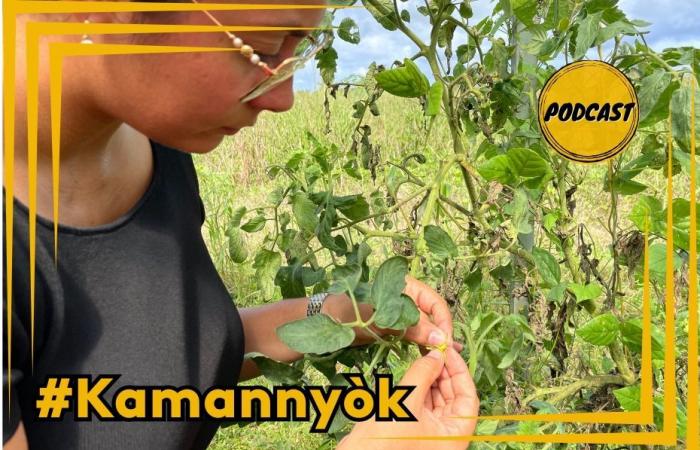He has become the number 1 enemy of the market gardeners of Guadeloupe! A very small midge, called “flower midge”, is currently causing major damage, mainly on tomatoes. The larvae of the insect devour the flower buds of plants, preventing fruiting. This emerging pest is the main cause of the fall in yields observed in 2024. Farmers are demanding emergency solutions to be able to continue producing.
In market gardening, especially in tropical conditions, there is no shortage of pests, including insects: thrips, leafminers, whiteflies, caterpillars, etc. Pests that attack the leaves of plants. But for several years, producers of Guadeloupe must face an emerging pest: the flower midge.
This is a tiny midge (0.5 to 3 mm), whose larvae penetrate the flower buds, which they devour from the inside, which prevents fruit from forming. The enemy therefore operates invisibly and insidiously. However, in the event of a heavy infestation of these maggots, the reduction in yield can exceed 90%! Marcel Böhrer, an engineer experimenting with market gardening systems at the Institut Technique Tropical (IT2), describes the parasite and the damage it causes on crops:
•
©Marcel Böhrer IT2
The flower midge was mentioned for the first time in Guadeloupe in 2015, on tomato plants. But it is especially since the beginning of 2024 that reports from producers have multiplied: mainly on tomatoes, but also on other nightshades such as eggplant, pepper or chili pepper; and also on cucurbits, such as watermelon or melon. After sampling and analyses, the species of the pest was officially identified last September: it is indeed a polyphagous midge, which means that it affects several families of plants, including orchids and hibiscus. …
To know if the pest is present on a cultivated plot and is thus responsible for an observed drop in yields, it is therefore necessary to closely monitor the progress of flowering:
How can we explain such an upsurge in flower midge in recent years in Guadeloupe? Climate change is highlighted, with wetter conditions (including in the so-called dry season), and rising temperatures; two factors that favor the development of the midge. Added to this is the withdrawal of certain insecticide molecules, previously used against other targets (such as leafminers), but which probably also had indirect effectiveness on midge; knowing that there is no phytosanitary product approved to fight systemically against this aggressor.
The current pressure from flower midge is so strong in the region that we are truly in the situation of a health emergency.
Marcel Böhrer, experimentation engineer at IT2
The Noirault family is at the head of a market gardening farm of more than one hundred hectares in Grande-Terre, with three major crops: watermelon, melon and tomato. The latter is cultivated on around thirty hectares, in Saint-François and Petit-Canal. But the largest tomato producer in the archipelago is seeing its annual harvest decrease from year to year: it has fallen from 800 to 300 tonnes in ten years (-62%). In 2024, yields have fallen by 26%. And the flower midge is already present on the first plantations for the new season:
The first tomatoes of the season are scheduled for the end of December, but midge attacks are occurring earlier and earlier. It’s truly catastrophic and we are very afraid for the future!
Caroline Noirault, farmer
•
©Josiane Champion
In 2024, some tomato growers had to stop their production in peak season, in the first half of the year, because tonnage drops reached up to 70% from the first harvests.
The local tomato has practically disappeared. Producers cannot continue. So if there are no solutions quickly enough, in 2025, the Guadeloupe tomato will no longer exist.
Victor Nanette, president of IGUAFLHOR
All crops combined, producer organizations in the market gardening sector are recording around 40% overall losses in 2024, compared to their harvest forecast established at the start of the year. The Guadeloupean Interprofession of Fruits, Vegetables and Horticulture (IGUAFLHOR) is calling for emergency measures from the authorities, in order to restart production as quickly as possible and thus meet the territory's food sovereignty objective. In mid-October, a delegation from IGUAFLHOR and IT2 went to Paris, where it was received by the Directorate General of Food (DGAL) at the Ministry of Agriculture. Market gardeners wish to obtain marketing authorizations (AMM) for 120 days (4 months), for certain targeted phytosanitary products, in relation to the damage suffered this year on crops.
This demand also exists at the national level and is currently being relaunched by certain agricultural unions mobilized in France. The new Minister of Agriculture, Annie Genevrard, announced on November 15 the reactivation of the “Solutions Committee”, set up at the start of the year by her predecessor. This includes making pesticides authorized in other European countries available in France.
Regarding flower midge, molecules will be tested in December on the 2nd tomato plantation on the Noirault farm, planted on November 20. Tests carried out by the CTCS (Sugar Cane Technical Center), the only structure approved in the Antilles for this type of experimentation. At the same time, IT2 is evaluating several agroecological levers to fight the pest in the short and longer term.
The report on the flower midge can be listened to as a podcast, in the “Kamannyòk” collection, by clicking here.






